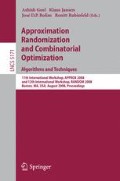Abstract
We study the directed minimum latency problem: given an n-vertex asymmetric metric (V,d) with a root vertex r ∈ V, find a spanning path originating at r that minimizes the sum of latencies at all vertices (the latency of any vertex v ∈ V is the distance from r to v along the path). This problem has been well-studied on symmetric metrics, and the best known approximation guarantee is 3.59 [3]. For any \(\frac{1}{\log n}<\epsilon<1\), we give an n O(1/ε) time algorithm for directed latency that achieves an approximation ratio of \(O(\rho\cdot \frac{n^\epsilon}{\epsilon^3})\), where ρ is the integrality gap of an LP relaxation for the asymmetric traveling salesman path problem [13,5]. We prove an upper bound \(\rho=O(\sqrt{n})\), which implies (for any fixed ε> 0) a polynomial time O(n 1/2 + ε)-approximation algorithm for directed latency.
In the special case of metrics induced by shortest-paths in an unweighted directed graph, we give an O(log2 n) approximation algorithm. As a consequence, we also obtain an O(log2 n) approximation algorithm for minimizing the weighted completion time in no-wait permutation flowshop scheduling. We note that even in unweighted directed graphs, the directed latency problem is at least as hard to approximate as the well-studied asymmetric traveling salesman problem, for which the best known approximation guarantee is O(logn).
Supported by NSF grant CCF-0728841.
Access this chapter
Tax calculation will be finalised at checkout
Purchases are for personal use only
Preview
Unable to display preview. Download preview PDF.
References
Blum, A., Chawla, S., Karger, D.R., Lane, T., Meyerson, A., Minkoff, M.: Approximation Algorithms for Orienteering and Discounted-Reward TSP. In: FOCS, pp. 46–55 (2003)
Blum, A., Chalasani, P., Coppersmith, D., Pulleyblank, W.R., Raghavan, P., Sudan, M.: The minimum latency problem. In: STOC, pp. 163–171 (1994)
Chaudhuri, K., Godfrey, B., Rao, S., Talwar, K.: Paths, Trees, and Minimum Latency Tours. In: FOCS, pp. 36–45 (2003)
Chekuri, C., Korula, N., Pal, M.: Improved Algorithms for Orienteering and Related Problems. In: SODA, pp. 661–670 (2008)
Chekuri, C., Pal, M.: An O(log n) Approximation Ratio for the Asymmetric Traveling Salesman Path Problem. Theory of Computing 3, 197–209 (2007)
Papadimitriou, C.H., Papageorgiou, G., Papakostantinou, N., Afrati, F., Cosmadakis, S.: The complexity of the traveling repairman problem. Informatique Theorique et Applications 20, 79–87 (1986)
Feige, U., Singh, M.: Improved Approximation Ratios for Traveling Salesperson Tours and Paths in Directed Graphs. In: APPROX-RANDOM, pp. 104–118 (2007)
Frank, A.: On Connectivity properties of Eulerian digraphs. Annals of Discrete Mathematics 41, 179–194 (1989)
Frieze, A., Galbiati, G., Maffioli, F.: On the worst-case performance of some algorithms for the asymmetric travelling salesman problem. Networks 12, 23–39 (1982)
Goemans, M., Kleinberg, J.: An improved approximation ratio for the minimum latency problem. Mathematical Programming 82, 111–124 (1998)
Jackson, B.: Some remarks on arc-connectivity, vertex splitting, and orientation in digraphs. Journal of Graph Theory 12(3), 429–436 (1988)
Kleinberg, J., Williamson, D.: Unpublished note (1998)
Lam, F., Newman, A.: Traveling salesman path problems. Mathematical Programming (2006) (online)
Minieka, E.: The delivery man problem on a tree network. Annals of Operations Research 18, 261–266 (1989)
Nagarajan, V., Ravi, R.: Poly-logarithmic approximation algorithms for directed vehicle routing problems. In: APPROX-RANDOM, pp. 257–270 (2007)
Nemhauser, G.L., Wolsey, L.A.: Integer and Combinatorial Optimization (1999)
Sahni, S., Gonzalez, T.: P-complete approximation problems. Journal of the ACM 23, 555–565 (1976)
Sviridenko, M.: Makespan Minimization in No-Wait Flow Shops: A Polynomial Time Approximation Scheme. SIAM J. Discret. Math. 16(2), 313–322 (2003)
Williamson, D.: Analysis of the held-karp heuristic for the traveling salesman problem. Master’s thesis, MIT Computer Science (1990)
Wismer, D.A.: Solution of the flowshop sheduling problem with no intermediate queues. Operations Research 20, 689–697 (1972)
Author information
Authors and Affiliations
Editor information
Rights and permissions
Copyright information
© 2008 Springer-Verlag Berlin Heidelberg
About this paper
Cite this paper
Nagarajan, V., Ravi, R. (2008). The Directed Minimum Latency Problem. In: Goel, A., Jansen, K., Rolim, J.D.P., Rubinfeld, R. (eds) Approximation, Randomization and Combinatorial Optimization. Algorithms and Techniques. APPROX RANDOM 2008 2008. Lecture Notes in Computer Science, vol 5171. Springer, Berlin, Heidelberg. https://doi.org/10.1007/978-3-540-85363-3_16
Download citation
DOI: https://doi.org/10.1007/978-3-540-85363-3_16
Publisher Name: Springer, Berlin, Heidelberg
Print ISBN: 978-3-540-85362-6
Online ISBN: 978-3-540-85363-3
eBook Packages: Computer ScienceComputer Science (R0)

